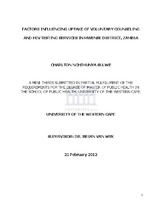Factors influencing uptake of voluntary counseling and HIV testing services in Mwense district, Zambia
Abstract
For more than two decades now, the acquired immune deficiency syndrome (AIDS) and its etiological agent, the human immunodeficiency virus (HIV), has been a growing challenge that affects all segments of the global population. Voluntary HIV counseling and testing (VCT) is one of the many prevention and control strategies adopted globally and by the Government of the Republic of Zambia. VCT is the process by which an individual undergoes counseling to enable him/her to make an informed choice about being tested for the human immunodeficiency virus (HIV). This decision must be entirely the choice of the individual and he or she must be assured that the process will be confidential. VCT is a key component of both HIV prevention and care programs. Although VCT is increasingly available in Zambia through public health facilities, VCT only or stand-alone sites and mobile counseling and testing services, there is still great reluctance among many people to be tested. Aim: This study explored factors affecting the utilization of VCT services in Mwense District, Zambia. Methodology: An explorative, qualitative study was conducted. Data was collected through focus group discussions with community members, and key informant interviews with lay counselors and health care workers. Thematic analysis of transcribed data was done to elucidate knowledge and awareness of HIV/AIDS and VCT services, factors facilitating uptake and barriers to utilization of VCT services and suggestions for improving VCT uptake. Results: The study found that HIV/AIDS was recognized as a major problem in the communities and that participants were aware of the availability and benefits of HIV counseling and testing services. The main reasons for seeking an HIV test included facilitating sexual behavior change to avoid infection, re-infection or infecting others with HIV. Facilitators to uptake of VCT services include accessing information on HIV/AIDS and other care and support services such as prevention of mother to child interventions, peer and social support systems, home-based care and early treatment with antiretroviral therapy if one is HIV positive. Community members indicated that VCT was an entry point to reaching out to the family and community for on-going counseling, which would lead to reduction in HIV/AIDS stigma and discrimination. Several barriers to VCT were identified by the participants. At individual level, barriers included: the fear of the ramifications of a positive test; fear of HIV/AIDS stigma and discrimination; doubt about the existence of HIV and AIDS; and fear of loss of control of life circumstances and destiny. Health facility level barriers included concerns about confidentiality of HIV-test results, familiarity with service providers, lack of promotional activities of the VCT services, shortage of testing logistics and commodities, and human resource shortages both in terms of numbers and confidence to promote VCT services. Community levels barriers included cultural beliefs and customs, gender imbalances, religious beliefs and stigma. Conclusions: There is urgent need for community sensitization about VCT and its benefits in HIV/AIDS control.

